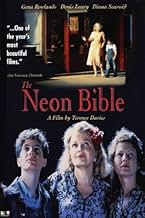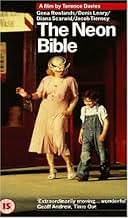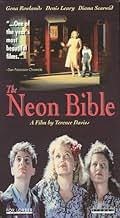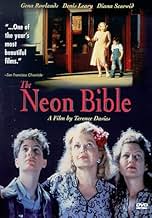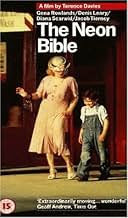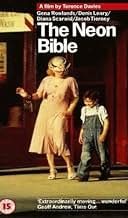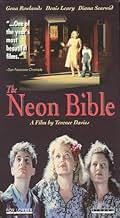Adicionar um enredo no seu idiomaWhile on a train, a teenage boy thinks about his life and the flamboyant aunt whose friendship acted as an emotional shield from his troubled family. This film evokes the haunting quality of... Ler tudoWhile on a train, a teenage boy thinks about his life and the flamboyant aunt whose friendship acted as an emotional shield from his troubled family. This film evokes the haunting quality of memory while creating a heartfelt portrait of a boy's life in a rural 1940s Southern town... Ler tudoWhile on a train, a teenage boy thinks about his life and the flamboyant aunt whose friendship acted as an emotional shield from his troubled family. This film evokes the haunting quality of memory while creating a heartfelt portrait of a boy's life in a rural 1940s Southern town.
- Direção
- Roteiristas
- Artistas
- Prêmios
- 1 vitória e 2 indicações no total
- Direção
- Roteiristas
- Elenco e equipe completos
- Produção, bilheteria e muito mais no IMDbPro
Avaliações em destaque
But this is horrifically off the mark.
The review of Davies' version of Edith Wharton's *House of Mirth* in the NY Times said that the movie was more like Charles Dickens than Edith Wharton. Which is exactly the criticism I had of this movie. These folks are not embodying American Southern farmers, they're acting like industrial working class people. I can understand and be sympathetic to the original story: my people, coming from South Carolina & Georgia, had lives very similar to the plot of this movie. Therefore, I could see where this could potentially be a very good film.
But nothing gets under my skin like an inability to see beyond one's own cultural bias...which is the major mistake of the director of this production. If you take the emotions, the gestures, the imagery of this film and put them in an industrial landscape, it would be an OK movie. But having people interact and react this way and have them being farmers in the Deep South is bogus, phony and w-a-y off the mark. If you want to see true southern Americana, skip this movie and see Elia Kazan's *Wild River* instead...
Edward Guthmann said the film was poorly received when it premiered at Cannes, but called it "gorgeous" and "one of the year's most beautiful films." He said it was a rewarding film that requires a little faith from the viewer due to long, slow, "lingering shots that work as a kind of meditation." He described the revival meeting at night "like an Edward Hopper or Thomas Hart Benton painting come to life." I will grant the film that it looks beautiful, but it lacks a deeper substance which would be necessary to make this a great film.
Director Terence Davies said "The Neon Bible doesn't work, and that's entirely my fault. The only thing I can say is that it's a transition work. And I couldn't have done The House of Mirth without it." I appreciate that he is humble enough to admit this is not his best work. Again, the film looks brilliant, so it's far from a complete failure. And you have to respect the brave casting decision that brought Denis Leary, not known for his subtle acting, on board.
The problem lies entirely at the feet of director Terence Davies . He directs in a poetic style or at least attempts to but where as a poetic film by Terewnce Malik or Sam Mendes works here it spectacular fails . . What sinks the film is the unnatural framing where a character is smack bang in the middle of the screen facing the camera . A lot of critics complain that a director like Danny Boyle shoots , frames and edits films in a similar manner but at least he brings a sense of variety to his movies . Here however Davies relies on the exact same framing technique throughout the entire film which sinks it as a cinematic presentation and feels more like a filmed theater play
So, I was naturally quite excited when I stumbled upon the DVD release of this movie; I wasn't even aware that any of Toole's work had been adapted to film. But I was also a little wary. Movies have a tendency to trivialize great books, and I predicted that "The Neon Bible" might, in cinematic form, degenerate into a depressing slog.
Alas, my prediction proved true. This movie is a slog. Director Terence Davies paces it like a funeral procession. He also fills the movie with weird, protracted shots of blackness, of whiteness, of starry skies; I imagine he's trying to be deep somehow, but all his slow zooms just bore me. Besides, at times he overplays the starry sky thing so much that it looks like the protagonists live in a cabin in outer space.
Both the book and the movie are anecdotal, but the book works because David - the shy teenage "hero" - makes an interesting narrator. His voice binds the anecdotes together, and naturally the reader learns about him through the narration. In this movie, though, he's largely silent; he just lurks around in the background of his own story. And, without his narration, the anecdotal scenes often make little sense and have no apparent connection.
I feel guilty about badmouthing this film, to an extent, because it at least strives for faithfulness. But the deadly slow pace really undermines everything. For instance, there's a Christian rally at one point, headed by an evangelist called Bobby Lee Taylor. In the book, this is a rousing set-piece, and Taylor is depicted as an energetic young man who really seems to believe the (ahem) propaganda he spouts. But, in the movie, Taylor is depicted as a lifeless old man, and he basically announces to the audience in an aside that he's a shyster. Ho-hum. That's the Hollywood trivializing machine at work. And the scene as a whole completely lacks energy, verve, oomph - whatever you want to call it.
This is going to sound like a strange statement, but I'm starting to develop a love-hate relationship with movies, with the emphasis on hate. It's always easy and tempting to pop a DVD in my player and relax for the evening, but I find lately that I get a lot more out of indulging in the brain-stimulating alternative pastime of reading. After all, books are, on the whole, lots better than movies. Case in point..."The Neon Bible."
I still can't stop hoping that, one day, they'll make a movie version of "Confederacy of Dunces." But I bet that'll be inferior to the book, too.
It is dreamy, corny, beautifully set-staged, almost, but its subject matter isn't. It traipses along as if in a trance, we are either taken in by its beauty or it just passes by, languidly, slowly, and yes, boringly.
I can't remember if anyone swore. There was blood, otherwise what happened? People sang quite a lot, embarrassingly, at times, otherwise one contrived scene floated into the next. True, I've not read the book, so cannot compare.
I think it could work if perhaps if it was written by Harold Pinter and directed like a Dennis Potter - jet black, violent and maybe then, memorable.
As it is, it's soppy, attempting to be different, where being different is like being different in the school playground; it looks odd, that oddness showing up over any potential good and thus making the film simply not work.
Você sabia?
- CuriosidadesIn an interview with "Time Out Film", Terence Davies said about this film, "[It] doesn't work, and that's entirely my fault. The only thing I can say is that it's a transition work. And I couldn't have done A Essência da Paixão (2000) without it."
- Citações
David, aged 15: If you were different from anybody else in town, you had to get out. They used to say in school, "you have to think for yourself," but you couldn't do that in town. You have to think what your father thought and that was what everybody thought.
- ConexõesFeatured in Fandor: Cannes You Dig It? | Fandor Spotlight (2022)
- Trilhas sonorasOh Lord, How Long?
Traditional
Principais escolhas
- How long is The Neon Bible?Fornecido pela Alexa
Detalhes
Bilheteria
- Faturamento bruto nos EUA e Canadá
- US$ 78.072
- Fim de semana de estreia nos EUA e Canadá
- US$ 5.045
- 3 de mar. de 1996
- Faturamento bruto mundial
- US$ 78.072
- Tempo de duração1 hora 31 minutos
- Cor
- Mixagem de som
- Proporção
- 2.35 : 1
Contribua para esta página


